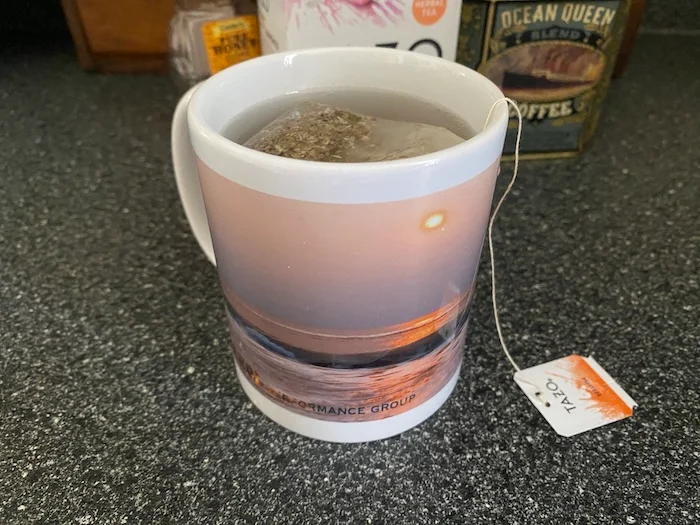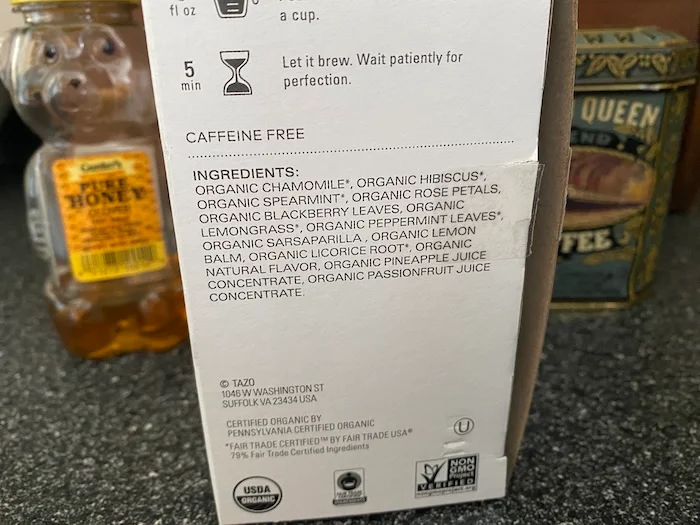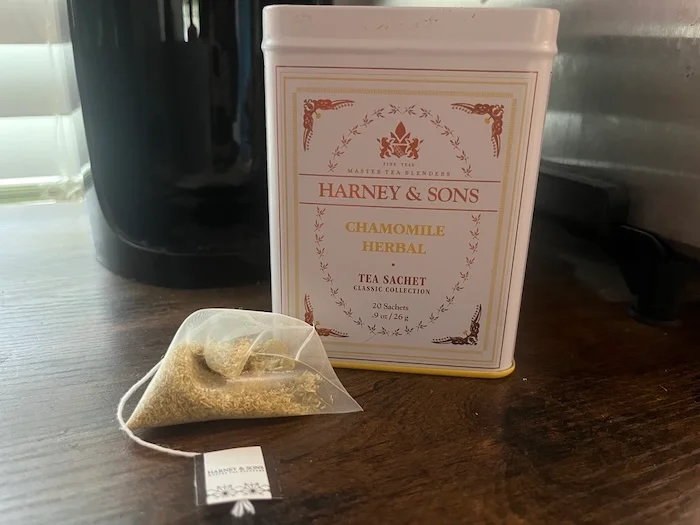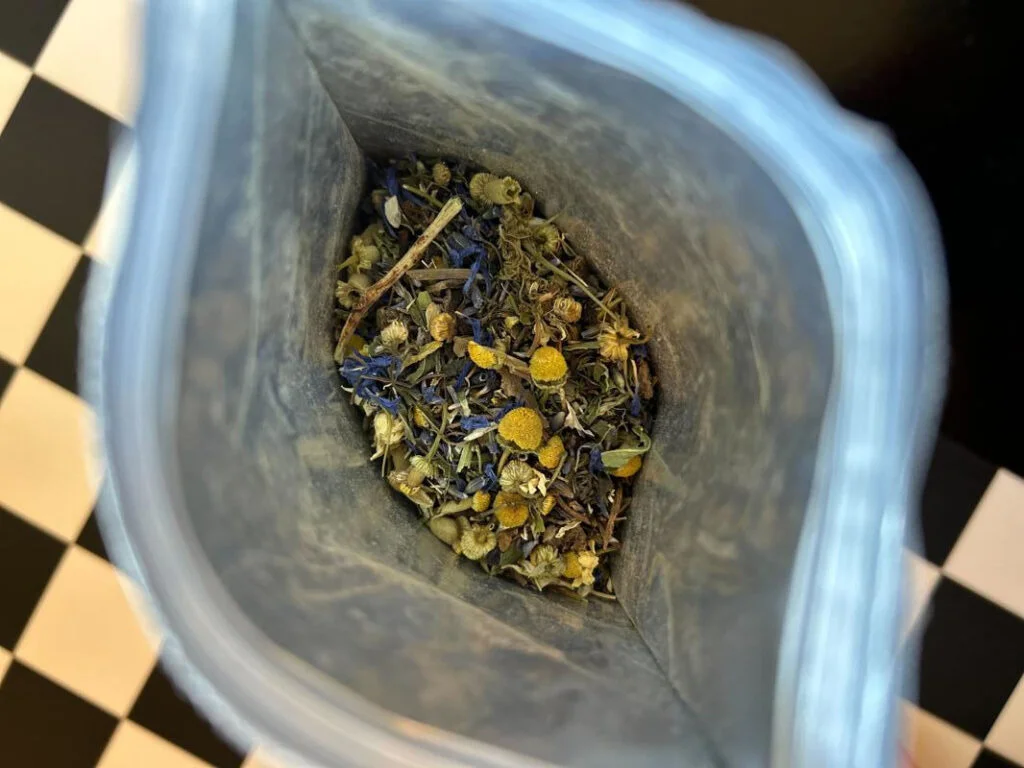Tossing and turning when you should be catching Zzzs takes a toll on your health, so it’s important to have an effective bedtime ritual to soothe yourself into a sleepy state. For many, that routine includes brewing and drinking a nice warm cup of chamomile tea.
We know what you’re thinking: “Chamomile tea? But isn’t tea generally caffeinated?”
It’s a viable concern. After all, caffeine is the stuff you drink when you’re trying to avoid sleeping. How could something with caffeine in it promote better sleep?
That’s why we’re diving into the topic today to determine if chamomile tea truly is caffeine-free, as well as explore the many benefits of chamomile tea and how it stacks up against other teas.
What Is Chamomile Tea?
You were right to catch that tea, in general, contains caffeine. So, how could chamomile tea make you sleepy when caffeine is a stimulant?
That’s because chamomile tea technically isn’t a tea at all, or at least not a “true tea.”
Let’s break it down — “true teas,” like your everyday green tea, black tea, white tea, etc., come from the Camellia sinensis plant. Camellia sinensis naturally contains caffeine, so when its leaves are plucked, dried, and placed in convenient tea bags for you to steep, you get that caffeinated goodness you crave when you’re busy burning the candle from both ends.

Chamomile tea, made from the matricaria chamomilla or German chamomile plant, is actually a tisane, more commonly referred to as an “herbal infusion.” Herbal teas, including chamomile, peppermint, ginger, hibiscus, and rooibos, are naturally caffeine-free.
That’s why chamomile tea, unlike true teas, promotes relaxation, induces drowsiness, and helps millions of people worldwide settle down when it’s time to go to sleep.
Does Chamomile Tea Contain Caffeine?
The short answer: No, chamomile tea does not contain caffeine.
Remember, all true teas come from the leaves of the Camellia sinensis plant, which naturally produce caffeine. Thus, when you brew a nice hot cup of jasmine, green, or oolong, the caffeine from the leaves is steeped into your cup and enters your system as you enjoy.
Chamomile flowers do not produce caffeine. Like most herbal teas, chamomile tea is naturally caffeine-free, making it the clear choice when it comes to choosing a proper bedtime beverage.
That said, you do want to have an eagle eye when it comes to chamomile tea packaging. Some chamomile tea products are blended with other types of tea, like green tea or black tea, so they contain caffeine.

You’ll want to peruse the packaging for some peace of mind, but chances are that, if what you’re drinking is 100-percent chamomile, then it’s 100-percent caffeine-free too.
Benefits of Drinking Chamomile Tea Before Bed
You just can’t beat a warm cup of chamomile tea before bed. It’s the perfect thing for setting the mood and helping you ease into a comfy, cozy, sleepy state before drifting off to dreamland.
There are actually many health benefits associated with drinking chamomile tea and/or using chamomile supplements.
Promotes Better Sleep
The special sauce responsible for chamomile’s trademark sleepytime effect is called apigenin1. Apigenin is an antioxidant that binds to the GABA receptors of your brain in order to produce a mild sedative effect, which may induce a feeling of drowsiness in some users.
A 2024 meta-analysis in Complementary Therapies in Medicine2 reviewed the effectiveness of chamomile as a sleep aid, ultimately concluding that “chamomile improved sleep, especially the number of awakenings after sleep or staying asleep.”

If you generally have trouble falling or staying asleep, we would still recommend discussing the problem with a qualified medical professional. However, drinking chamomile tea before bedtime may work as a non-medical, relatively risk-free way of getting better sleep, so don’t count it out!
Relieves Stress and Anxiety
Drinking chamomile tea may also help reduce stress and anxiety.
A 2024 review in Clinical Nutrition Research3 explored the “sedative efficacy of chamomile as an herbal medicine for anxiety treatment.” They found that consuming chamomile daily, whether by taking chamomile extract as a supplement or drinking chamomile tea, is “effective in improving anxiety.”
You should always discuss medical symptoms with a doctor first and foremost, but the anxiolytic effects of chamomile coupled with the findings of the above study suggests that having a warm cup of chamomile tea may improve mental health and wellness by reducing stress and anxiety.
Supports Good Digestion
Chamomile also exhibits anti-inflammatory properties, so sipping chamomile may soothe a sour stomach and help with uncomfortable gastrointestinal symptoms like gas and bloating.
According to a 2022 review in Molecules4, chamomile may “relieve pain caused by functional digestive disorders,” while a 2023 study in the Journal of Ayurveda and Integrative Medicine5 determined that “chamomile has a potential therapeutic effect on the gastrointestinal and can reduce flatulence.”

That’s not all: A review in Molecular Medicine Reports6 noted that the flavonoids in chamomile also inhibit the growth of Helicobacter pylori, a bacteria that contributes to stomach ulcers. It’s by no means a panacea, but you may combat the growth of stomach ulcers or get relief from ulcer-related pain by drinking chamomile tea regularly.
Chamomile Tea vs. Other Herbal Teas
Chamomile, as a bedtime tea, demolishes traditional teas because it’s naturally caffeine-free. Compare that to the average caffeine content found in one cup of your traditional black, green, and white teas, and it’s no contest:
- Black Tea: 40 to 70 milligrams
- Green Tea: 20 to 45 milligrams
- White Tea: 15 to 30 milligrams
- Chamomile: 0 milligrams
Other herbal teas, like the minty-fresh peppermint tea, the earthy rooibos tea, or the tart and fruity hibiscus tea, make excellent bedtime choices too because, like chamomile, they’re not “true teas” that come from the Camellia sinensis plant. They’re herbal infusions, so they also contain no caffeine whatsoever.
Potential Side Effects and Considerations
Most folks don’t have to think twice before buying a box of chamomile tea bags and steeping to their heart’s content, but there are some potential side effects to consider before you ingrain the popular bedtime remedy into your personal routine.
Allergies
German and Roman chamomile flowers are in the Asteraceae or daisy family, meaning people who are allergic to ragweed, daisies, marigolds, or chrysanthemums may experience an allergic reaction to chamomile too.

If you’ve had sensitivities to any of these plants, check with your doctor or another healthcare professional before drinking chamomile tea or taking chamomile supplements.
Medication Interactions
A 2024 randomized controlled trial in the Journal of Applied Laboratory Medicine7 observed that chamomile displayed anticoagulant properties, meaning it would take more time for your blood to clot if you had recently or have regularly consumed chamomile.
That’s not inherently bad, but it could be a problem for an individual taking blood thinners to manage an illness or health condition. The trial did note that “the clinical significance of [these properties] is unclear… and warrants further investigation,” but it’s prudent to err on the side of caution and discuss the risks of using chamomile with your doctor just in case.
Special Populations
At a glance, there’s nothing harmful in chamomile, but its safety for children, pregnant women, and those who are breastfeeding hasn’t been firmly established and warrants further study.
In fact, a 2025 review in Cureus8 found that using chamomile products while pregnant may negatively impact “preterm labor/delivery, miscarriage risk, and birth weight and length.” The review also referred to the evidence supporting this conclusion as “weak,” but it’s nonetheless crucial for pregnant individuals to consult their doctors regarding the risks of using chamomile prior to incorporating it into their wellness routines.
Conclusion
We understand there’s an adage about things that are too good to be true.
Chamomile may not be a “true tea,” but it is truly caffeine-free, making it an easy addition to any bedtime routine that needs a certain je ne sais quoi to bring the relaxation to a whole new level. We here at Sleepopolis are all about building better sleep habits, so why not take advantage of every natural and holistic remedy at your disposal?

Don’t suffer another sleepless night; try adding chamomile tea to your bedtime routine today and see if it’s the thing you’ve been missing all along. What do you have to lose?
FAQs
Is chamomile tea naturally caffeine-free?
All “true teas” come from the leaves of the Camellia sinensis plant, which naturally contain some caffeine. Chamomile tea, on the other hand, is not technically a tea, but an herbal infusion made from the flowers of the matricaria chamomilla, which does not contain caffeine.
So, yes: Chamomile tea is naturally caffeine-free.
Can chamomile tea keep you awake?
It’s possible, but unlikely.
Chamomile is widely regarded as a sleepytime tea because apigenin binds to receptors in your brain to promote relaxation and induce drowsiness. It’s possible that someone would experience the complete opposite effect, as we’re all different and unique individuals, but it generally should help soothe you to sleep rather than make you alert and awake.
How does chamomile tea compare to green tea in terms of caffeine?
Green tea offers a host of holistic health benefits too, but promoting relaxation and restful sleep isn’t one of them. That’s because green tea typically contains between 20 and 45 milligrams of caffeine per cup versus chamomile tea, which contains no caffeine whatsoever.
What you drink during the day is your choice, but drinking chamomile tea before bed is regarded as the better option given the fact that it’s naturally caffeine-free.
What’s the best time to drink chamomile tea for sleep?
Are you ready to give chamomile tea a spin? Steep that bag and enjoy approximately 30 to 45 minutes before bed to give your body enough time to absorb its calming compounds and set the stage for a great night’s sleep.
Sources
- Viola H, Wasowski C, Levi de Stein M, et al. Apigenin, a component of Matricaria recutita flowers, is a central benzodiazepine receptors-ligand with anxiolytic effects. Planta Med. 1995;61(3):213-216. doi:10.1055/s-2006-958058
- Kazemi A, Shojaei-Zarghani S, Eskandarzadeh P, Hashempur MH. Effects of chamomile (Matricaria chamomilla L.) on sleep: A systematic review and meta-analysis of clinical trials. Complement Ther Med. 2024;84:103071. doi:10.1016/j.ctim.2024.103071
- Saadatmand S, Zohroudi F, Tangestani H. The Effect of Oral Chamomile on Anxiety: A Systematic Review of Clinical Trials. Clin Nutr Res. 2024;13(2):139-147. Published 2024 Apr 23. doi:10.7762/cnr.2024.13.2.139
- Dai YL, Li Y, Wang Q, et al. Chamomile: A Review of Its Traditional Uses, Chemical Constituents, Pharmacological Activities and Quality Control Studies. Molecules. 2022;28(1):133. Published 2022 Dec 23. doi:10.3390/molecules28010133
- Salimi Zadak R, Khalili G, Motamedi M, Bakhtiari S. The effect of chamomile on flatulence after the laparoscopic cholecystectomy: A randomized triple-blind placebo-controlled clinical trial. J Ayurveda Integr Med. 2023;14(3):100735. doi:10.1016/j.jaim.2023.100735
- Srivastava JK, Shankar E, Gupta S. Chamomile: A herbal medicine of the past with bright future. Mol Med Rep. 2010;3(6):895-901. doi:10.3892/mmr.2010.377
- Kimura R, Schwartz JA, Romeiser JL, et al. The Acute Effect of Chamomile Intake on Blood Coagulation Tests in Healthy Volunteers: A Randomized Trial. J Appl Lab Med. 2024;9(3):468-476. doi:10.1093/jalm/jfad120
- Ferguson T, Gordon B. The Efficacy and Safety of Using Chamomile Products During Pregnancy and the Postpartum Period. Cureus. 2025;17(3):e81527. Published 2025 Mar 31. doi:10.7759/cureus.81527

























